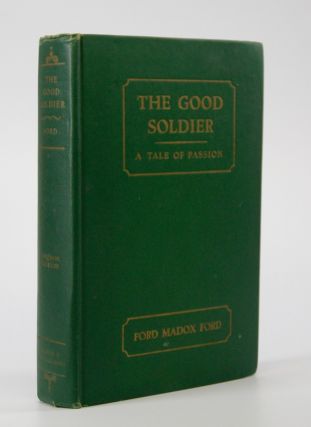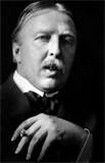Ford, Ford Madox. The Good Soldier. New York. 1927. Albert & Charles Boni. hardcover.
A brilliant novel of deceit and tragic intensity.
 FROM THE PUBLISHER -
FROM THE PUBLISHER -

Ford Madox Ford has been among the neglected writers of the first quarter of this century. His tragic novel, THE GOOD SOLDIER, in which he portrays, in the stoical but fallible figure of Edward Ashburnham, an example of the English landed gentry at its best, was written just before the First World War. This unembittered story of deceit and hatred was readily termed 'great', 'a piece of art and therefore an enlightenment', and 'beautiful and moving' by contemporary reviewers. A more modern estimate of its worth is expressed by Walter Allen in Tradition and Dream: 'Ford's finest novel is probably THE GOOD SOLDIER, as formally perfect a novel as any in English and an amazingly subtle account, by one of them, of the lives of four people who appear to live in harmony and friendship.'
 Ford Madox Ford (17 December 1873 – 26 June 1939), born Ford Hermann Hueffer, was an English novelist, poet, critic and editor whose journals, The English Review and The Transatlantic Review, were instrumental in the development of early 20th-century English literature. He is now remembered best for his publications The Good Soldier (1915), the Parade's End tetralogy (1924–28) and The Fifth Queen trilogy (1906–08). The Good Soldier is frequently included among the great literature of the 20th century, including the Modern Library 100 Best Novels, The Observer's ‘100 Greatest Novels of All Time’, and The Guardian's ‘1000 novels everyone must read’. Ford was born to Catherine and Francis Hueffer, the eldest of three; his brother was Oliver Madox Hueffer. His father, who became music critic for The Times, was German and his mother English. His paternal grandfather Johann Hermann Hüffer was first to publish the fellow Westphalian poet and author Annette von Droste-Hülshoff, a Catholic aristocrat. He used the name of Ford Madox Hueffer and during 1919 changed it to Ford Madox Ford (allegedly, in the aftermath of World War I because ‘Hueffer’ sounded too German) in honour of his grandfather, the Pre-Raphaelite painter Ford Madox Brown, whose biography he had written. One of his most famous works is The Good Soldier (1915), a novel set just before World War I which chronicles the tragic lives of two ‘perfect couples’ using intricate flashbacks. In the ‘Dedicatory Letter to Stella Ford’, his wife, that prefaces the novel, Ford reports that a friend pronounced The Good Soldier ‘the finest French novel in the English language!’ Ford pronounced himself a ‘Tory mad about historic continuity’ and believed the novelist's function was to serve as the historian of his own time. Ford was involved with British war propaganda after the beginning of World War I. He worked for the War Propaganda Bureau, managed by C. F. G. Masterman, with other writers and scholars who were popular during that time, such as Arnold Bennett, G. K. Chesterton, John Galsworthy, Hilaire Belloc and Gilbert Murray. Ford wrote two propaganda books for Masterman, namely When Blood is Their Argument: An Analysis of Prussian Culture (1915), with the help of Richard Aldington, and Between St Dennis and St George: A Sketch of Three Civilizations (1915). After writing the two propaganda books, Ford enlisted at 41 years of age into the Welch Regiment on 30 July 1915, and was sent to France, thus ending his cooperation with the War Propaganda Bureau. His combat experiences and his previous propaganda activities inspired his tetralogy Parade's End (1924–1928), set in England and on the Western Front before, during and after World War I. Ford also wrote dozens of novels as well as essays, poetry, memoirs and literary criticism, and collaborated with Joseph Conrad on three novels, The Inheritors (1901), Romance (1903) and The Nature of a Crime (1924, although written much earlier). During the three to five years after this direct collaboration, Ford's best known achievement was The Fifth Queen trilogy (1906–1908), historical novels based on the life of Katharine Howard, which Conrad termed, at the time, ‘the swan song of historical romance.’ Ford's novel Ladies Whose Bright Eyes (1911, extensively revised during 1935) is, in a sense, the reverse of Twain's novel A Connecticut Yankee in King Arthur's Court. During 1908, he initiated The English Review, in which he published works by Thomas Hardy, H. G. Wells, Joseph Conrad, Henry James, John Galsworthy and William Butler Yeats, and gave debuts to Wyndham Lewis, D. H. Lawrence and Norman Douglas. During 1924, he initiated The Transatlantic Review, a journal with great influence on modern literature. Staying with the artistic community in the Latin Quarter of Paris, he befriended James Joyce, Ernest Hemingway, Gertrude Stein, Ezra Pound and Jean Rhys, all of whom he would publish (Ford is the model for the character Braddocks in Hemingway's The Sun Also Rises). As a critic, he is known for remarking ‘Open the book to page ninety-nine and read, and the quality of the whole will be revealed to you.’ George Seldes recounts Ford's disappointment with Hemingway: ‘'and he disowns me now that he has become better known than I am.' Tears now came to Ford's eyes.’ Ford says, ‘I helped Joseph Conrad, I helped Hemingway. I helped a dozen, a score of writers, and many of them have beaten me. I'm now an old man and I'll die without making a name like Hemingway.’ Seldes observes, ‘At this climax Ford began to sob. Then he began to cry.’ Hemingway devoted a chapter of his Parisian memoir A Moveable Feast to an encounter with Ford at a café in Paris during the early 1920s. During a later sojourn in the United States, he was involved with Allen Tate, Caroline Gordon, Katherine Anne Porter and Robert Lowell (who was then a student). Ford was always a champion of new literature and literary experimentation. During 1929, he published The English Novel: From the Earliest Days to the Death of Joseph Conrad, a brisk and accessible overview of the history of English novels. He had an affair with Jean Rhys, which ended acrimoniously. Ford spent the last years of his life teaching at Olivet College in Michigan, and died in Deauville, France, at the age of 65.
Ford Madox Ford (17 December 1873 – 26 June 1939), born Ford Hermann Hueffer, was an English novelist, poet, critic and editor whose journals, The English Review and The Transatlantic Review, were instrumental in the development of early 20th-century English literature. He is now remembered best for his publications The Good Soldier (1915), the Parade's End tetralogy (1924–28) and The Fifth Queen trilogy (1906–08). The Good Soldier is frequently included among the great literature of the 20th century, including the Modern Library 100 Best Novels, The Observer's ‘100 Greatest Novels of All Time’, and The Guardian's ‘1000 novels everyone must read’. Ford was born to Catherine and Francis Hueffer, the eldest of three; his brother was Oliver Madox Hueffer. His father, who became music critic for The Times, was German and his mother English. His paternal grandfather Johann Hermann Hüffer was first to publish the fellow Westphalian poet and author Annette von Droste-Hülshoff, a Catholic aristocrat. He used the name of Ford Madox Hueffer and during 1919 changed it to Ford Madox Ford (allegedly, in the aftermath of World War I because ‘Hueffer’ sounded too German) in honour of his grandfather, the Pre-Raphaelite painter Ford Madox Brown, whose biography he had written. One of his most famous works is The Good Soldier (1915), a novel set just before World War I which chronicles the tragic lives of two ‘perfect couples’ using intricate flashbacks. In the ‘Dedicatory Letter to Stella Ford’, his wife, that prefaces the novel, Ford reports that a friend pronounced The Good Soldier ‘the finest French novel in the English language!’ Ford pronounced himself a ‘Tory mad about historic continuity’ and believed the novelist's function was to serve as the historian of his own time. Ford was involved with British war propaganda after the beginning of World War I. He worked for the War Propaganda Bureau, managed by C. F. G. Masterman, with other writers and scholars who were popular during that time, such as Arnold Bennett, G. K. Chesterton, John Galsworthy, Hilaire Belloc and Gilbert Murray. Ford wrote two propaganda books for Masterman, namely When Blood is Their Argument: An Analysis of Prussian Culture (1915), with the help of Richard Aldington, and Between St Dennis and St George: A Sketch of Three Civilizations (1915). After writing the two propaganda books, Ford enlisted at 41 years of age into the Welch Regiment on 30 July 1915, and was sent to France, thus ending his cooperation with the War Propaganda Bureau. His combat experiences and his previous propaganda activities inspired his tetralogy Parade's End (1924–1928), set in England and on the Western Front before, during and after World War I. Ford also wrote dozens of novels as well as essays, poetry, memoirs and literary criticism, and collaborated with Joseph Conrad on three novels, The Inheritors (1901), Romance (1903) and The Nature of a Crime (1924, although written much earlier). During the three to five years after this direct collaboration, Ford's best known achievement was The Fifth Queen trilogy (1906–1908), historical novels based on the life of Katharine Howard, which Conrad termed, at the time, ‘the swan song of historical romance.’ Ford's novel Ladies Whose Bright Eyes (1911, extensively revised during 1935) is, in a sense, the reverse of Twain's novel A Connecticut Yankee in King Arthur's Court. During 1908, he initiated The English Review, in which he published works by Thomas Hardy, H. G. Wells, Joseph Conrad, Henry James, John Galsworthy and William Butler Yeats, and gave debuts to Wyndham Lewis, D. H. Lawrence and Norman Douglas. During 1924, he initiated The Transatlantic Review, a journal with great influence on modern literature. Staying with the artistic community in the Latin Quarter of Paris, he befriended James Joyce, Ernest Hemingway, Gertrude Stein, Ezra Pound and Jean Rhys, all of whom he would publish (Ford is the model for the character Braddocks in Hemingway's The Sun Also Rises). As a critic, he is known for remarking ‘Open the book to page ninety-nine and read, and the quality of the whole will be revealed to you.’ George Seldes recounts Ford's disappointment with Hemingway: ‘'and he disowns me now that he has become better known than I am.' Tears now came to Ford's eyes.’ Ford says, ‘I helped Joseph Conrad, I helped Hemingway. I helped a dozen, a score of writers, and many of them have beaten me. I'm now an old man and I'll die without making a name like Hemingway.’ Seldes observes, ‘At this climax Ford began to sob. Then he began to cry.’ Hemingway devoted a chapter of his Parisian memoir A Moveable Feast to an encounter with Ford at a café in Paris during the early 1920s. During a later sojourn in the United States, he was involved with Allen Tate, Caroline Gordon, Katherine Anne Porter and Robert Lowell (who was then a student). Ford was always a champion of new literature and literary experimentation. During 1929, he published The English Novel: From the Earliest Days to the Death of Joseph Conrad, a brisk and accessible overview of the history of English novels. He had an affair with Jean Rhys, which ended acrimoniously. Ford spent the last years of his life teaching at Olivet College in Michigan, and died in Deauville, France, at the age of 65.